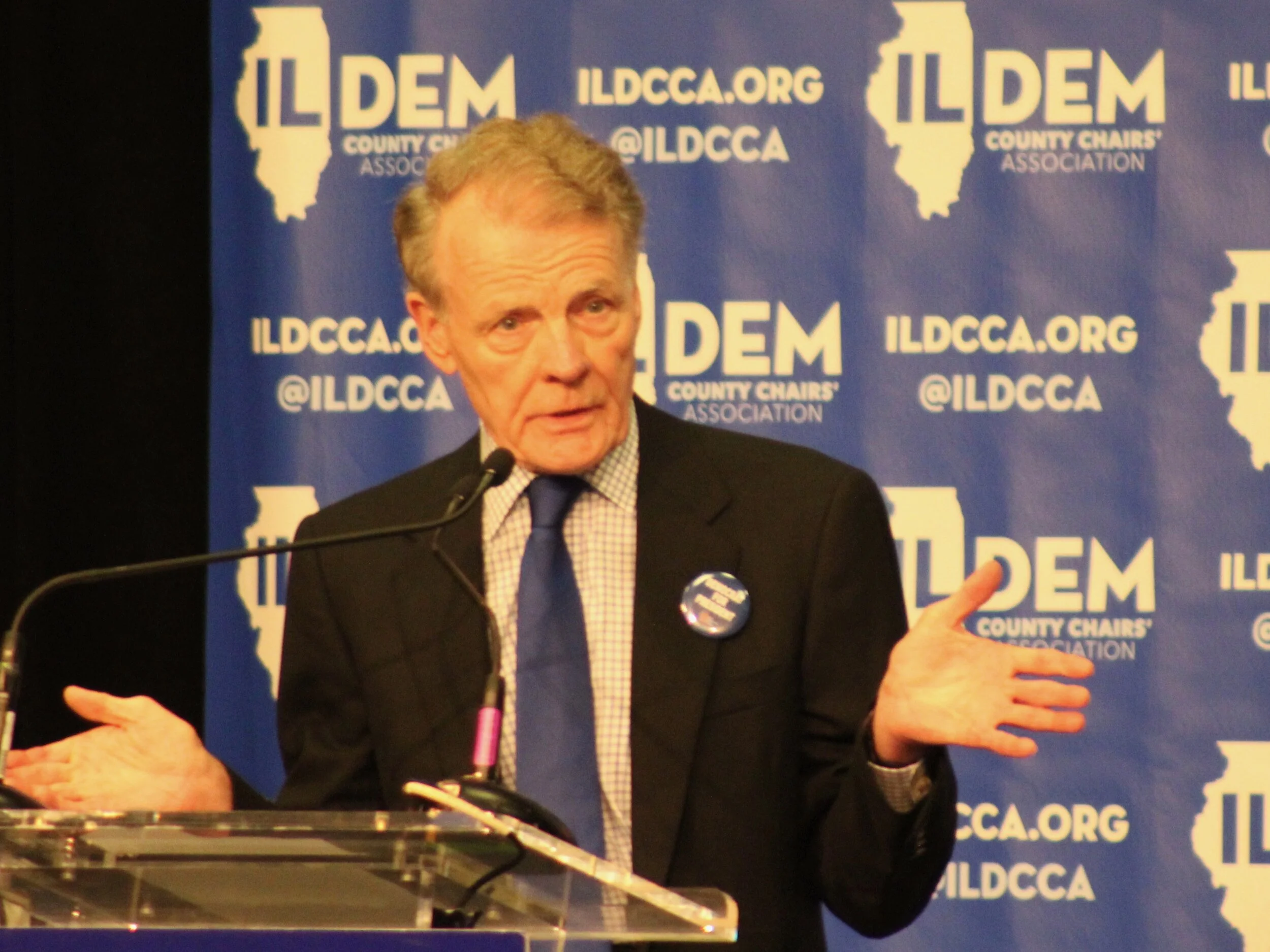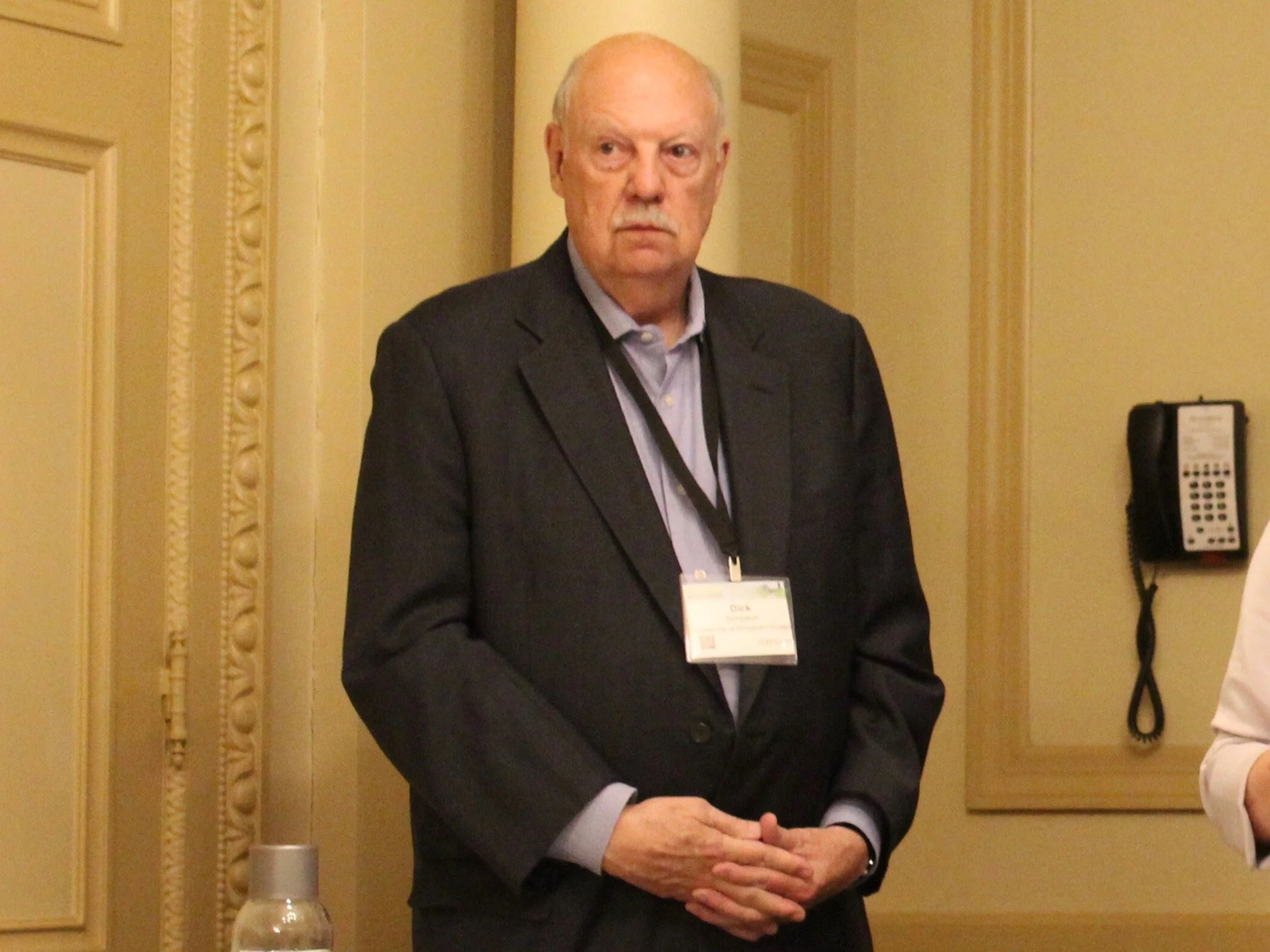Negative TV ads on corruption swayed tax vote
UIC Prof Simpson says GOP also benefited from door-to-door canvassing in pandemic
Did the ComEd bribery scandal swirling around House Speaker Michael Madigan make anti-corruption TV ads against the Fair Tax Amendment resonate with voters? (One Illinois/Ted Cox)
By Ted Cox
A reform-minded political-science professor said Thursday that negative TV ads tilted the Illinois electorate against the Fair Tax Amendment, especially on the issue of corruption, and that the Republican ground game generally benefited from a more blithe attitude toward the pandemic in canvassing door to door.
In a webinar on this week’s 2020 general election, Professor Dick Simpson said it was the most expensive election not just in U.S. history, but in the world, with $14 billion spent, more than a third of that on the presidential campaign. It also produced the highest U.S. vote total, 160 million, and a two-thirds turnout nationwide, the highest since the 1900 campaign. That all served to illustrate “how close the election was, how important the election was, and how much was at stake in this election.”
With Vice President Joe Biden’s victory in Illinois assured, however, the main issue on the ballot statewide was the Fair Tax Amendment backed by Gov. Pritzker, which needed a 60 percent supermajority to alter the state constitution, and yet didn’t even gather a majority, as 55 percent of the votes cast were in opposition. That came even as the General Assembly had passed tax brackets for a graduated income tax that would have slightly cut taxes or left them level for 97 percent of Illinoisans, while only those earning more than $250,000 were to pay more.
“The high negative advertising against it, particularly on television, was having an effect,” Simpson said. “The advertising essentially was tying the problem of corruption” to the ballot initiative. “The ads were able to convince the people of Illinois they shouldn’t trust those corrupt politicians down in Springfield with more tax money.”
Simpson, who was the lone reformer on the Chicago City Council in the ‘70s, has made an issue of corruption ever since as a college professor, and he was a top adviser to Mayor Lori Lightfoot in her successful anti-corruption campaign last year. He cited the ongoing federal investigation into ComEd bribery in the General Assembly, with Illinois House Speaker Michael Madigan already formally identified as a key figure, although without being charged.
UIC Professor Dick Simpson has been a noted reformer since his time on the Chicago City Council in the ‘70s. (One Illinois/Ted Cox)
According to Simpson, the issue of raising taxes in a recession also resonated with voters, even with the tax hikes being targeted for those making more than $250,000. “People were nervous that wouldn’t be true,” he said, in the belief that “in the middle of a recession it would be too much.”
Simpson attributed the generally strong showing by Republicans, both nationally and in Illinois, to a stronger ground game, which is usually a Democratic strength. But in the ongoing pandemic, he pointed out, Republicans proved more wiling to get out and do door-to-door canvassing, while Democrats fell back on email, phone banks, and social media. “In a race like this,” he said, “that just isn’t enough,” and that dynamic might also have played out in the the debate over the Fair Tax.
“We are now faced with how do we make up the money that might have come in from the graduated income tax. Are we going to have higher taxes or are we going to have cuts?” Simpson said. “There are some very direct consequences for the university,” he added, with the possibility that a 10 percent cut in state funding could force a tuition increase.
He said if if the state considered an increase in the flat tax rate it might also consider expanding exemptions, along with tax on services similar to a sales tax, “to make it more fair and to generate more revenue.”
Money was also an issue in politics, with Simpson estimating it takes $4 million to make a legitimate run for Congress in the current environment. One U.S. House race saw $33 million spent, and one U.S. Senate race generated $180 million. Combined with the influence of dark-money Political Action Committees, he said, “That undermines, to a large extent, our democracy.”
Simpson said the U.S. electorate is “more polarized than at any time since the late 19th century,” typified by “the most extreme rhetoric,” with one side calling the other fascist and the other side calling the one socialist. He said that reflects “how far apart we are.”
For better or worse, he said, “The overall election result did not satisfy either side,” especially with Vice President Joe Biden seemingly headed to victory over President Trump once all the votes are counted. With Democrats holding on to a slight majority in the U.S. House, and Republicans appearing to retain a razor-thin edge in the Senate, “It’s pretty much a gridlock situation in Washington.”
“We are polarized in the public itself,” Simpson added. “Demonizing each side and thinking that every Republican is evil or every Democrat is evil is not a good thing. And we don’t know quite how to get out from polarization, because it is helpful — that is, if you’re an elected official, having a polarized electorate, if you’re in the majority, keeps you in power,” he said. “Finding those those things that we could have victories together would help.”


